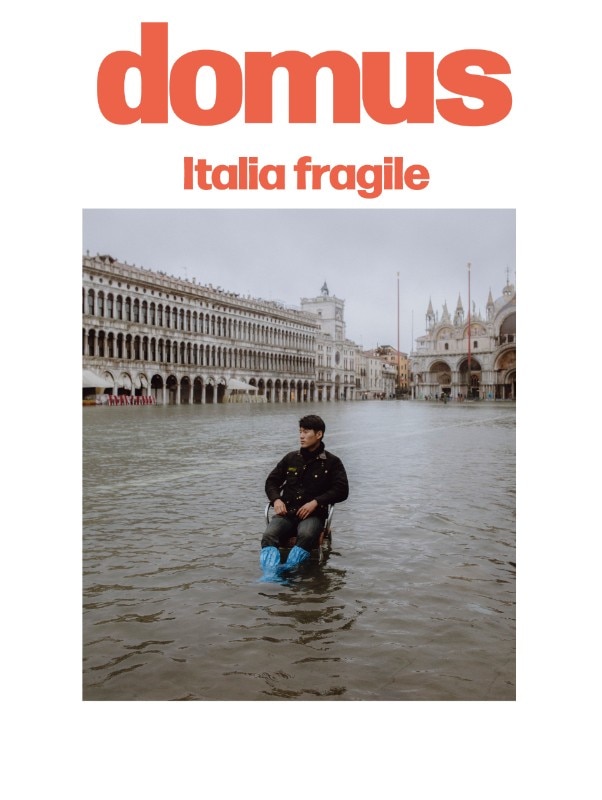Italia fragile is the seventh stage in Domus’s journey, bringing its year to a close. A real journey, but also an initiation into the mystery of a country that, when closely observed, is not so mysterious. Following There’s no Italy without a thorn (2017), on the pride of Italian work, Fabbrica Italia (2018), the analysis of production in relation to the territory, Milano Italia (2019) on the most advanced city in its speed of change, Recovering Italy (2020), devoted to the country’s ability to respond to the pandemic, Italian journey (2021) on cultural spaces, and Italy, the state of the art (2022), dealing with the development of museums, this issue addresses the fragility of Italy’s housing, which in recent periods has increased sharply.
We will remember 2023 as Italy’s hottest year on record, and the one when it rained the least, despite almost 200 “extreme weather events” causing deaths and devastating the architectural, industrial, cultural and social heritage. The frailties revealed by climate change affect 91 per cent of Italian municipalities, with 13 per cent of buildings exposed to medium-high hazard, and 38,000 cultural works endangered by erosion or landslides. These are grisly records.
The reasons are deep-seated and related to other critical issues in Italy, such as spending on education, which amounts to 3.9 per cent of GDP compared to 6.5 per cent in Norway, and well below the European average of 4.4 per cent, with Italy just ahead of Greece and Hungary. In Italy, 11.5 per cent of young people aged 18 to 24 drop out of education and only 17 out of 100 gain a degree, compared to a European average of 30. Some 17.2 per cent choose administrative and legal subjects, 16 the humanities, and 7.4 per cent scientific subjects that take them abroad.
The ideology of tourism and finance, with every homeowner acquiring the mindset of a hotelier or broker, is no bad thing in itself. But it risks becoming the only tool by which cities reorganise spaces, policies and urban economies, eliminating the priorities of citizens and maximising those of travellers and speculators.
We are a country of bureaucrats, accountants and politicians. We can hardly expect them to protect us from vulnerabilities. The housing emergency stems from this. Or rather from reasons clearly described by Carlo Cipolla and Giuseppe Prezzolini, the latter in a prophetic book with the same title as this issue: Italia fragile. A land of double standards, where culture has no value, except to flatter the powers that be; where the public sphere is a concept to be plundered, and the private sphere is not adapted to the development of civil life; where elections are won with promises that cannot be kept, and the territory is an opportunity to be exploited, like the Superbonus tax credit for eco-renovation projects. All financed by those unable to protest because they have not yet been born.
The objective data of the housing emergency stems from all this and much else. Suffice it to say that there are some 760,000 public social homes, or 300,000 fewer than needed, despite over a century of efforts first to build them (the 1903 Luzzati Law; the post-war INA-Casa plan, known as the Fanfani plan; Law 167 of 1962) and then to privatise them (Law 560 of 1993 and Law 80 of 2014, the famous Renzi-Lupi Housing Plan).
This frailty of housing is now being aggravated by at least two phenomena: tourismification and the financialisation of the global market. Italy’s historic features favour the needs of tourists to the detriment of residents, a trend that has accelerated since 2017 with Law 96, liberalising short-term rentals. The ideology of tourism and finance, with every homeowner acquiring the mindset of a hotelier or broker, is no bad thing in itself. But it risks becoming the only tool by which cities reorganise spaces, policies and urban economies, eliminating the priorities of citizens and maximising those of travellers and speculators. It is the reality of this historical period, of the culture and market that produce it, which we contribute to whether we like it or not. We have to acknowledge and accept this, without ceasing to question whether it coincides with the idea of individuals, communities and the future that we have and desire.
Opening image: Cover Domus 1085, December 2023. Tourist in Piazza San Marco, Venice, 2019. Photo © Matteo de Mayda




